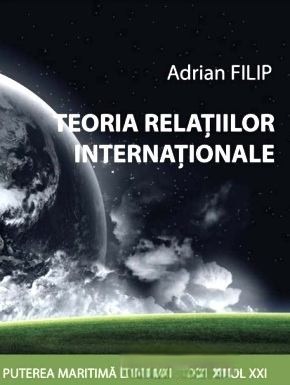Descriere
Descarcă carte Teoria relațiilor internaționale de Andrian Filip carte .PDF Analiza evoluției situațiilor internaționale și a relațiilor dintre state de-a lungul istoriei a constituit la un moment dat un nou teren de studiu al științelor sociale, care a fost materializat în teoriei relațiilor internaționale. Relațiile de putere dintre state au constituit obiectul de studiu al acestei noi teorii. Pe parcursul acestui studiu vom analiza cu precădere relațiile de putere și domeniul puterii maritime. Indiferent de orientare, teoria relațiilor internaționale pleacă de la următoarele teze: statele reprezintă actorii politicii mondiale; comportamentul marilor puteri este influențat în principal de mediul extern și mai puțin de cel intern; statele se află într-o competiție continuă pentru putere. Puterea este unul din cele mai vehiculate concepte ale Teoriei relațiilor internaționale. Lupta pentru obținerea acesteia este unul din mecanismele care au dus la evoluția civilizației umane. După analiza conceptelor de putere, a caracteristicilor conflictelor internaționale, a tipurilor de polarizare a puterii, a luptei marilor puteri pentru întâietate și a componentelor puterii unui stat, am dezvoltat una dintre ele Teoria Relaţiilor Internaţionale - Puterea Maritimă mentele de putere ale unui stat, și anume puterea maritimă, rolul ei și beneficiile pe care le poate aduce unui stat maritim care este conștient de necesitatea dezvoltării acesteia. Puterea maritimă, componentă a puterii statului, nu este doar apanajul marilor puteri, care au capacitatea de a construi, instrui și menține flote imense, ci și al statelor cu interese maritime, care conștientizează la nivelul conducerii statului și al națiunii, importanța mării pentru existența și dezvoltarea prezentă și viitoare a propriului popor. Puterea maritimă nu trebuie confundată cu puterea navală, forța navală sau capacitățile militare navale ale unui stat, aceasta fiind un concept mult mai larg, pe care voi încerca să îl dezvolt în acest studiu. Conceptul de putere maritimă a unui stat, are mai multe niveluri, în funcție de gradul de dezvoltare al componentelor puterii: Puteri maritime de nivel global; Puteri maritime de nivel regional; Puteri maritime ale statelor cu flote inferioare. Lucrarea este un demers pentru ridicarea României de la nivelul periferiei europene, la statutul pe care îl merită, de stat european de nivel mediu. România își va depăși complexul de inferioritate în fața altor state NATO sau europene, în momentul în care va reuși să pună în practică o politică statală și navală coerentă, care să se ridice la nivelul așteptărilor statelor partenere. Este un element fundamental al revenirii noastre în concertul popoarelor civilizate, de țară care să fie ascultată și respectată, de către statele din zona de influență. Maritime power has brought added value to the sta- tes that have had this power and used it. The maritime power is part of the state power. It is not only the privilege of great powers which have the capa- bility to build, train and maintain immense fleets, but also of the countries with maritime interests, which acknow- ledge at the state management level the importance of the sea for their very existence and also for the present and fu- ture development of its people. Starting from the fact that Romania is a medium level European maritime power, in this paper I have set out to answer the following questions: What are the European geopolitical conditions at the beginning of the third millennium? Why power has been and continues to be a guarantee for the safety of a state and its alliances? Why maritime power has been and continues to be the determining factor in the development of maritime states? What was the evolution of Romania's maritime po- wer? A mid-level country like Romania can protect, pro- mote, or impose its interests in the maritime and land area of focus, provided that it is able to create a maritime po- wer. Military contribution to the effort of building a mari- time power is not the largest and is not solely the attribute of the military, but it requires its efforts. In Chapter 1, The struggle for power between nations, in the International Relati- onship Theory, I analyzed the evolution of the concepts of power, power struggle and power balance, in the context of the beginning of the XXI century. Teoria Relaţiilor Internaţionale - Puterea Maritimă Power is one of the most circulated concepts of in- ternational relationship theory, and the struggle for power was one of the mechanisms that led to the evolution of hu- man civilization. The general notion of a state's power includes the potential power and actual power. The potential power is limited to items such as: population, weapons, infrastruc- ture and national wealth, while real power includes many more factors, many of which are not quantifiable. The world has generally been multi-polar and for short periods of time uni-polar or bipolar. The last bipolar period of the Warsaw Pact and North Atlantic Pact blocks, was only a transitional period from multi-polar western powers to the uni-polar of the U.S. hegemony. We can state that empires were precursors of the great powers of the end of the second millennium and the beginning of the third millennium, having common basic characteristics: superior organization; prompt mobilization capability, for military purposes; high technological capabilities; significant resources; large populations. Multi-polarism as a form of world politics is com- posed of an anarchic system of states interconnect but not controlled by a centralized government. It is a characteris- tic of multi-polar systems in which there are no great po- wers acting as arbiters, which could correct aggressive be- haviors. The First World War introduced a new era of global geopolitical restructuring, which was continued after the Second World War, with the world transitioning from multi-polarism, supported by seven to eight great powers, to bipolarism.



